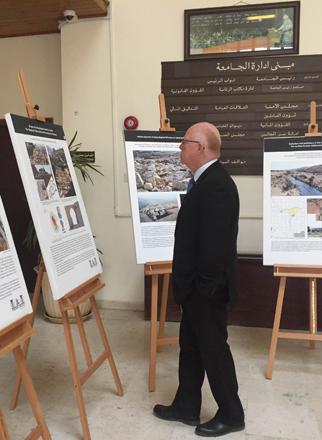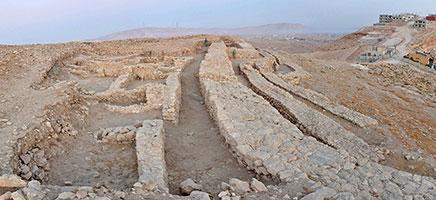You are here
Archaeologists trace history through water resources
By Suzanna Goussous - Oct 18,2016 - Last updated at Oct 18,2016

A visitor tours an exhibition highlighting the discoveries of Italian archaeological missions in Jordan (Photo by Suzanna Goussous)
AMMAN — Italian archaeologists have been visiting Jordan since the early 1920s, researchers said on Tuesday, noting that these missions strengthened ties and cultural dialogue between the countries.
At a seminar at the University of Jordan (UJ) on Tuesday on the paths of Jordanian civilisation, as seen through Italian archaeological excavations, Italian researchers discussed water resources across the millennia in Jordan and the conservation of historical sites.
Andrea Polcaro, a professor at Italy’s University of Perugia, is co-directing the Jabal Mutawwaq site, a mountain that was surrounded by water resources during the 4th millennium BC in Transjordan Highlands.
“For us, the topic of water is very important, because our site is a 4th millennium BC site, when Jordan suffered an ecological crisis from the end of the water climate condition,” he said.
The site, Polcaro added, is settled along the Wadi Zarqa River, a very important source of water during that time, since the river supplied “fresh water throughout all seasons of the year”.
The problem was solved by the people of Mutawwaq, who opened paths and a network of roads between the mountain and springs, said the professor. The economy of the area remained the same, he said, with some cultivation in the valley.
“In the period before, [during the 5th millennium BC], Jordan had more water resources than the [current] time. We see that many sites [were] abandoned and people moved from the semi-deserted area close to the river valley,” he told The Jordan Times.
Professor Guido Vannini, from the University of Florence, discussed changing water management and exploitation strategies at Petra’s Al Wuayra area.
“It was possible to document the area of Nabataean time, it was a sanctuary… with the systematic survey, we saw all the cuts in the rocks used not only for agriculture, but also religious use for the residents of the area,” Vannini told The Jordan Times.
The area was inhabited during the Roman and Byzantine periods, he said, and it was “modified” for different settlements.
“For instance, the little wadi in Petra that was used by Nabataeans for directions, was closed and covered with wood to be used for cold water,” Vannini added.
The area was abandoned from the 7th to the 11th centuries, he said, when the site was a stable, unchanged place.
The current archaeological mission will last for two months, according to team members, who will be examining different sites around Jordan.
University of Rome – La Sapienza Professor Lorenzo Nigro tackled the issue of water and power in early cities in Jordan and water control in the 3rd millennium BC.
“In 2004, we discovered one of the earliest cities in this country, Khirbet Al Batrawi… It was a major centre controlling the upper valley of the Zarqa River,” he added.
Nigro said the city dates back to the same era of the pharaohs, adding that the area contained Egyptian items.
“The river was a road leading people to Jordan. The river was a source of life for the community, which started the experience of urbanisation… which started a real revolution in archaeology,” he told The Jordan Times.
Romel Ghreeb, deputising for the director of the Department of Antiquities, said the long-standing relations between Jordan and Italy resulted in important projects in all sectors.
“Many Italian archaeological missions to Jordan [are] working across [the Kingdom], including: Wadi Zarqa, Shobak, Petra, Wadi Rum, and Khirbet Al Batrawi,” he added.
Italian Ambassador to Jordan Giovanni Brauzzi said the conference is held in the framework of the “Italian Legacy in Jordan Campaign”.
“We feel that we are not totally foreigners in this country; we are in part of the landscape for a long line in [several] activities but especially in the archaeological field,” the ambassador said at the seminar.
Academic research on archaeological missions, he said, is “something with roots in society”.
For his part, UJ President Azmi Mahafza said the seminar aims to deepen people’s understanding of Jordan’s past, with the help of specialist Jordanian and Italian archaeologists.
“There is no need to emphasise that water means life, and that life on earth and our existence are dependent on water… this is compatible with development and civilisation,” he added.
“While in antiquity, water played a vital role in the urbanisation of Jordan, it is alarming to know that Jordan right now is among the poorest countries in water worldwide… it is anticipated that water will dominate the politics of the world by the end of the 21st century.”
Related Articles
AMMAN — High above the Zarqa River, the mountaintop ‘Temple of the Serpents’ gives clues to the development of human communities during the
AMMAN — With the aim of excavating an early urban centre, the Italian Sapienza University of Rome has conducted a project in Khirbet Al Batr
AMMAN — During the fourth millennium BC, a new culture appeared in the southern Levant, with a “pronounced” attitude towards adapting the so

















